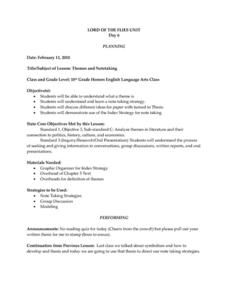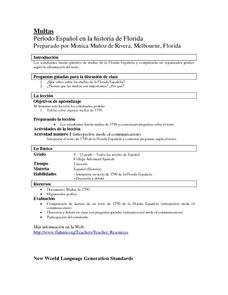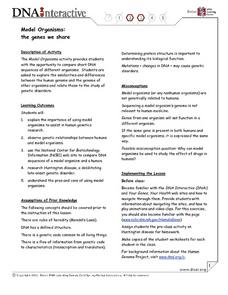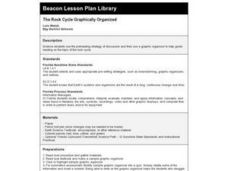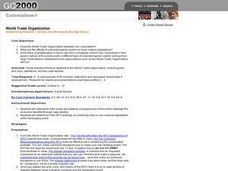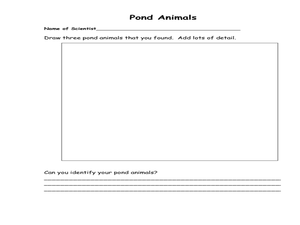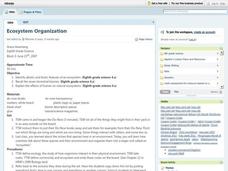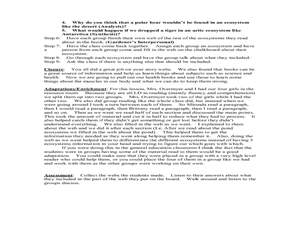Novelinks
Lord of the Flies: Themes and Notetaking
William Golding's Lord of the Flies is a treasure trove of symbolism and literary themes. Help your kids note the richest passages in the book with a lesson and graphic organizer. The lesson prepares kids to come up with a thesis...
Curated OER
Multas
Combine history and Spanish instruction with an exploration of descriptions of fines given in Florida in 1790. Partners read the brief text, fill out a graphic organizer about the crimes described, and interview each other about fines....
Curated OER
How was the Constitution Used to Organize the New Government?
How did the United States Congress determine how the new president and vice president would be named when the nation was first established? Who would provide money for the government, and how would the executive branch be organized?
Curated OER
Model Organisms: The Genes We Share
Middle schoolers gather information about gene banks. In this biology lesson, students work in groups to complete an activity sheet about genetic databases and organism genomes. Lesson includes extension ideas.
Curated OER
International Children's Rights Organizations
Distinguish specific historical aspects of international organizations and identify the role played by international organizations such as UNICEF, Amnesty International, International Labor Organization, Human Rights Watch and Child...
Curated OER
It's All in the Making: Our Local Organizations
Learners study African American nonprofit organizations. In this nonprofit organizations lesson plan, students discuss African American organizations. Learners research the NAACP and NUL website. Students design posters for both groups....
Curated OER
Introduction to Organ Systems
Students dissect frogs to study the body's organs /organ systems and to think critically about them. This 2-part instructional activity involves mapping the human body's organs & then dissecting a frog.
Curated OER
The Rock Cycle Graphically Organized
Fourth graders use the prereading strategy of discussion and then use a graphic organizer to help guide reading on the topic of the rock cycle. They use a worksheet imbedded in this plan to guide thier inquiry.
Curated OER
Micro-organisms
Students learn what a micro-organism is. In this micro-organism lesson, students understand that micro-organisms may be too small to see. Students learn microorganisms could be bacteria, fungi, something beneficial or a harmful microbe....
Curated OER
Organisms and Their Environment
In this organisms and their environment worksheet, students will review concepts relating to ecological studies, levels of organization in ecology, and relationships between organisms in ecosystems. This worksheet has 10 fill in the...
Curated OER
Get To Know Your Local Philanthropic Organizations
Students develop appropriate interview questions, interview a philanthropic organization, and present information to the class. They use pamphlets and/or other materials gained during their interviews to mount a display about the local...
Curated OER
How Are the Eyes of Different Organisms Adapted for Sight?
Young scholars compare/contrast the human eye to two other organisms. They use micro viewers to identify the human eye structures, complete a Venn diagram worksheet, identify the function of each eye structure, and answer discussion...
Curated OER
World Trade Organization
Students determine if the social and political consequences of free trade outweigh the economic benefits through case studies. They determine of the World Trade Organization willingly or unwillingly aids in neo-colonial exploitation of...
Curated OER
From Graphic Organizer to Comparison
Fifth graders brainstorm a variety of topics for writing. As a class, learners create four types of graphic organizers on selected topics. They discuss how to use graphic organizer in constructing a written paragraph.
Curated OER
Gathering, Evaluating, And Organizing Information for a Report
Students gather and organize information for a research report on a topic of their choosing. Each students selects a subject for their research. Using traditional and electronic data they reference four or more appropriate resources...
Curated OER
Endangered Organism Project
Students examine how different organisms meet the characteristics of life. They study specific endangered species and what caused their endangerment. They vcomplete a power point research project.
Curated OER
Pond and Pond Organisms
Learners explore pond ecosystems. In this pond organism activity, students will use pond water and a plastic bad in order to locate and identify freshwater organisms. The activity is designed for younger grades, but includes an...
Curated OER
The Brain and the Sense Organs - Lesson Plan
Students identify the five sense organs and state the uses of the five senses.
Curated OER
Ecosystem Organization
Eighth graders engage in a lesson about ecosystems with the intention of looking at how it is organized. They cover the biotic and abiotic factors of an ecosystem while looking at the seven types of terrestrial biomes. Students write...
Curated OER
Simple Organic Compounds
In this organic compounds worksheet, high schoolers review 8 terms associated with hydrocarbon molecules. Students find these 8 terms in a word search.
Curated OER
Graphic Organizers Aid Comprehension
Students create story webs to aid comprehension of ecosystems. In this reading strategies activity, students discover the importance of organizing information while reading a nonfiction text. Students produce story webs to communicate...
Curated OER
Comparing and Contrasting Fiction and Nonfiction Using Graphic Organizers
Students compare and contrast fiction and non-fiction selections. In this writing skills lesson, students use different forms of graphic organizers to compare "The Three Little Pigs," to Wiesel's Night.
Curated OER
Animals: Graphic Organizer
Second graders research information on the animal of their choice using the James E. Gerholt animal series books. They create a graphic organizer (concept web) using Kid Pix Deluxe 3 software, display information on screen, and create a...
Curated OER
How Do Organisms Vary?
Students study variation of organisms. They determine this variation arises from genetic and environmental causes.
Other popular searches
- Classifying Organisms
- Classification of Organisms
- Basic Needs of Organisms
- Aerobic Organisms
- Extinct Organisms
- Genetically Modified Organisms
- Freshwater Organisms
- Relationships Among Organisms
- Interdependence Organisms
- Extinction of Organisms
- Pathogenic Organism
- Multicellular Organisms


